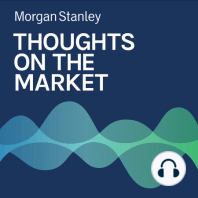4 min listen

U.S. Politics: How the Midterms Could Affect Your Tax Rates
U.S. Politics: How the Midterms Could Affect Your Tax Rates
ratings:
Length:
5 minutes
Released:
Jun 7, 2022
Format:
Podcast episode
Description
As some provisions of the Tax Cuts and Jobs Act start to kick in and others are set to expire, the future of U.S. tax rates may hinge on the results of the upcoming midterm elections. Head of U.S. Public Policy Research and Municipal Strategy Michael Zezas and Head of Global Valuation, Accounting and Tax Todd Castagno discuss.-----Transcript-----Michael Zezas: Welcome to Thoughts on the Market. I'm Michael Zezas, Head of U.S. Public Policy Research and Municipal Strategy for Morgan Stanley. Todd Castagno: And I'm Todd Castagno, Head of Global Valuation, Accounting and Tax for Morgan Stanley Research. Michael Zezas: And on this special edition of the podcast, we'll be talking about the 2022 U.S. midterm elections and the potential impact on individual and corporate taxes. It's Tuesday, June 7th, at 10:00 AM in New York. Michael Zezas: If you're a regular listener, you may have heard my conversation with our chief U.S. Economist, Ellen Zentner, last week about the economic implications of this year's midterm elections. This week, Todd Castagno and I are going to continue the midterm election topic because individual and corporate taxes could be set to increase starting this year. But the question is how high, when and what the impact from the election could be. So, Todd, you and I have talked about this and we agree that taxes are likely headed higher for both individuals and corporations. Maybe you can tell us why that is. Todd Castagno: Thanks, Michael. And it's really a driving function of how the Tax Cuts and Jobs Act was passed. And that's because Congress used the budget reconciliation legislation, which is primarily temporary. So, for instance, the individual provisions generally all expire at the end of 2025. And business tax increases have already started to phase in this year. So extension of the status quo for both businesses and individuals really is a function of the political landscape heading into midterms and then the next presidential election. Michael Zezas: Okay. So let's start with the individual taxes. Maybe you can name some provisions set to expire and what the changes would be. Todd Castagno: So Michael, let's first provide an overview of what the Tax Cuts and Jobs Act did for individuals. First, it reduced individual tax rates. Second, it almost doubled the standard deduction, meaning fewer taxpayers require itemized deductions. It provided a generous 20% deduction for small businesses, and pass-through businesses. It provided a much more generous child tax care credit, that's also refundable. And then the alternative minimum tax was reduced, so fewer taxpayers were caught in that tax. All these provisions are set to expire at the end of 2025 if Congress does not act. Michael Zezas: Let's shift over to corporate taxes. The Tax Cuts and Jobs Act lowered the corporate tax rate to 21% in 2017. Is there a chance we could see that climb? And to what level? Todd Castagno: That's true. One of the only permanent items of the Tax Cuts and Jobs Act was to reduce the corporate tax rate from 35% to 21%. However, starting this year, there are other tax increases within the corporate tax system. For instance, the requirement to amortize R&D costs over 5 years starts this year. That will primarily affect technology companies. And then there's elimination of favorable media expensing for capital expenditures, that starts to phase out next year, and that primarily would impact manufacturing and industrial companies. And then there's more restrictive deductibility of interest expense. So these in conjunction, will raise tax obligations. And it really depends on the political climate of how these get extended, and if that 21% corporate rate may nudge higher. Michael Zezas: Todd. Last October, you and I talked in the podcast about a two pillar tax overhaul which would come out of global tax reform. Nine months later, how do you see that playing out? Todd Castagno: So there's an ongoing effort to A, change the mix of which c
Released:
Jun 7, 2022
Format:
Podcast episode
Titles in the series (100)
Andrew Sheets: A Second (and Third) Opinion for Equity Markets by Thoughts on the Market